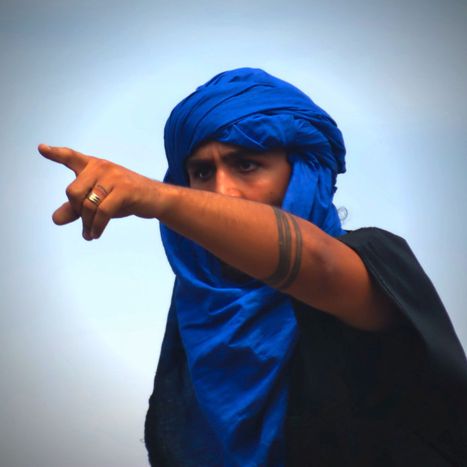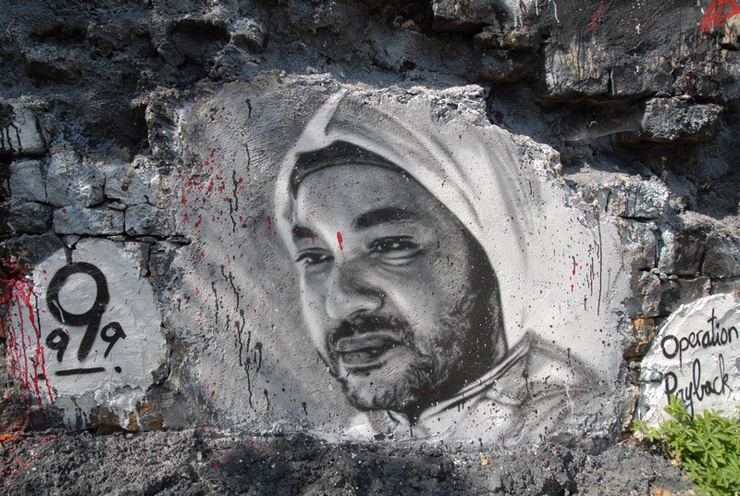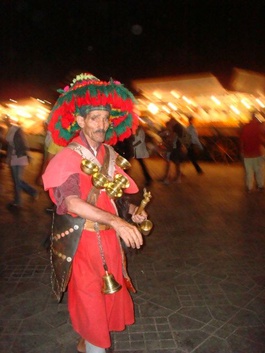
Arab spring in Morocco: royalists recognise indigenous language
Published on
Translation by:
Lorna SlaneLarge-scale protests, like those seen on 20 February 2011, continue to be a familiar sight in Morocco. We talk to young Moroccans whose demands follow in the footsteps of the Arab spring – democracy, freedom, social justice – albeit with a royalist twist
Constitutional reform, voted in by 98.5 % of voters (but boycotted by some left-wing parties and trade unions), has introduced some elements of democracy to Morocco's political system. However, many Moroccans consider these changes ‘cosmetic’. Protests continue in many Moroccan cities and even in European cities such as Paris.
'Hypocrites and thieves more royalist than the king himself'
This will be the first Sunday since 20 February 2011 that Najah will not be attending a protest in Germany. The young student believes in the need to establish a real democracy, and takes part in meetings and protests organised by the 20 February movement. It has the support of many NGOs as well as five political parties. Morocco has a very active civil society, and the protests in themselves are nothing new to the country. In 2004, a movement navigated by associations led to a reform of the personal status or family law, introducing considerable improvements to women’s rights. However, not all of the protesters continue to be as committed as Najah. Soufiane has stopped attending protests, saying that whilst some things have changed since the constitutional reform, corruption continues. He constantly condemns the ‘thieves’, the officials who make their fortunes to the detriment of ordinary citizens. On the facebook page for the 20 February movement in Casablanca, Karim Chakib writes: ‘We are all royalists. However, watch out for hypocrites and thieves more royalist than the king himself.’

Amar, from Marrakech in western Morocco, notes that the movement is changing from a political one to an increasingly social one. This transformation is reflected by the fact that protests are being relocated from the main boulevards (for example, in front of the parliament) to working class neighbourhoods. ‘We need to go to the people’, explains Yassir de Rabat. He is a member of three associations and is part of the 4% of Moroccans who are members of a political party or trade union. He boycotted the referendum on constitutional reform, judging it to be ‘cosmetic’. Yassir could envisage the possibility of Morocco without a king ‘should the king continue to ignore the demands made by activists.’
Nevertheless, many revolutionaries agree that Mohammed VI has to yield some of his power, while not calling on him to abdicate entirely. The king enjoys the benefits of drawing his legitimacy from three sources: religious legitimacy (as a direct descendant of the prophet Muhammad), historical legitimacy (for 12 centuries, Morocco has been a monarchy and the only Arab country not to come under Ottoman rule), and an external political legitimacy (the reforms introduced by Mohammed VI have been commended by the European union and European council.)
King for the day
 Saïd does not consider himself to be a member of the movement for change, although he has taken part in some demonstrations. Since the announcement of the legislative elections which were held on 25 November 2011 and the new constitution’s recognition of the Amazigh language, which is spoken by the indigenous Berber minority, he has no longer felt any need to take to the streets. The Berber question is of great importance to many Casablancans, he explains.
Saïd does not consider himself to be a member of the movement for change, although he has taken part in some demonstrations. Since the announcement of the legislative elections which were held on 25 November 2011 and the new constitution’s recognition of the Amazigh language, which is spoken by the indigenous Berber minority, he has no longer felt any need to take to the streets. The Berber question is of great importance to many Casablancans, he explains.
Yousra and Amal do not belong to the revolutionary movement either. Yousra believes the king has made reforms, and has done well to launch economic programmes. ‘That’s what accounts for the relative calm in Morocco compared to in the rest of the Arab world,' she says. In contrast, Amal is fighting for women’s rights. She is not prepared to be part of a group whose members include islamists. It is on this issue that the movement sparks controversy and divides fellow revolutionaries, families, friends, civil society, and the left-wing. Ali, a French teacher, is optimistic about the fundamental changes set to take place in Morocco. However, she admits that in order to achieve these changes, time and hard work will be needed.
Images: main (cc) ares tavolazzi; Mohammed VI (cc) Adobe of Chaos, Berber alkanchaglar, all courtesy of flickr
Translated from Maghreb : personnages en quête d’un printemps marocain



